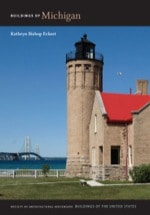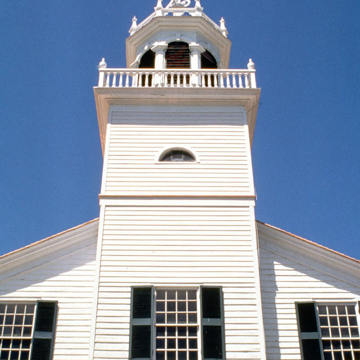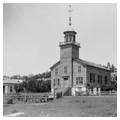The Mission Church is a simple classical wooden building with a single square tower, with entrance and a pinnacled and spired octagonal belfry that resemble its New England colonial and Federal antecedents. Built by Heydenburk, a carpenter and teacher at the Mission School, with funds raised by the villagers and traders of Mackinac Island and a gift from John Jacob Astor, it served the Protestant Indian mission begun here in 1822. The Reverend William Montague Ferry, a Massachusetts-born graduate of Union and Rutgers colleges, established a mission post on Mackinac Island under the auspices of the United Foreign Missionary Society. Its purpose was “to civilize and educate” the Indians and, in exchange for protection from the fort, to exert a moral and religious influence on both the men at the fort and the native inhabitants of the island. The mission closed in 1837 as the island's population declined with the withdrawal of the American Fur Company. After remaining unused for more than fifty years, in the 1890s the church was reopened at irregular intervals for interfaith services for island and summer residents, and in 1955 was acquired by the Mackinac Island State Park Commission.
You are here
Mission Church
If SAH Archipedia has been useful to you, please consider supporting it.
SAH Archipedia tells the story of the United States through its buildings, landscapes, and cities. This freely available resource empowers the public with authoritative knowledge that deepens their understanding and appreciation of the built environment. But the Society of Architectural Historians, which created SAH Archipedia with University of Virginia Press, needs your support to maintain the high-caliber research, writing, photography, cartography, editing, design, and programming that make SAH Archipedia a trusted online resource available to all who value the history of place, heritage tourism, and learning.





